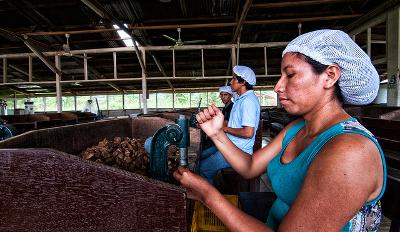
- Complaint alleges that Peru is failing to respect minimum labor standards contained in the U.S.–Peru Trade Promotion Agreement
- Violations Have Implications for Trans-Pacific Partnership
A complaint alleging that the Government of Peru is failing to comply with the labor standards of the U.S.-Peru Trade Promotion Agreement (PTPA) was filed on July 23, 2015, by the International Labor Rights Forum (ILRF), Peru Equidad, and Peruvian unions representing workers in the textile & garment and agro-export industries. The agreement became effective in February of 2009.
The complaint alleges that the Government of Peru is failing to enforce basic labor laws in its garment, textile, and agricultural export sectors, which together employ hundreds of thousands of workers who produce billions of dollars of goods for the U.S. market.
It also raises new questions regarding the labor rights record of a key member of the Trans-Pacific Partnership (TPP), the Obama Administration’s proposed mega-trade deal that will, on paper, require all members to maintain and enforce labor laws consistent with recognized International Labor Organization standards.
The complaint breaks new ground by testing a key provision of the “May 10th Agreement,” arguing that Peru’s Non-Traditional Export Promotion Law fails to comply with minimum standards on freedom of association adopted by the International Labor Organization (ILO). The special export law exempts employers from key parts of the general labor code by allowing them to hire virtually their entire workforce for an unlimited duration on a series of renewable, temporary contracts, some as short as 15 days. Garment and textile employers have taken advantage of the special law by systematically declining to renew the contracts of thousands of workers who joined unions in an effort to improve wages and working conditions.
This is not the first-time Peru’s Non-Traditional Export Promotion Law has been in the spotlight: The ILO has expressed severe concerns about the law, and in 2013 five U.S.-based multi-nationals (including Nike, New Balance, and PVH Corp.) wrote a public letter to President Ollanta Humala stating their concern that it may violate their corporate codes of conduct which require respect for workers’ fundamental labor rights.
The complaint also presents a number of emblematic case studies which show how the Government of Peru is failing to enforce its own labor laws in both the textile & garment and agro-export sectors. Major Peruvian companies in these export sectors violate Peruvian labor laws with virtual impunity, dismissing workers for union activity, employing workers on fraudulent contracts, and failing to pay legally mandated bonuses. Even in cases where labor inspectors have found violations, fines are too low to deter employer misconduct and often go unpaid.
The submission enjoys the support of the three major union federations that directly represent textile, garment, and agro-export workers. It also contains a list of recommendations for the government of Peru to come into compliance with its obligations under the PTPA, including the repeal of several key articles of the Non-Traditional Export Promotion Law, the repeal or modification of the Agricultural Sector Promotion Law, and strengthened oversight of employer use of temporary contracts.
Check the links below for media coverage of the complaint!

